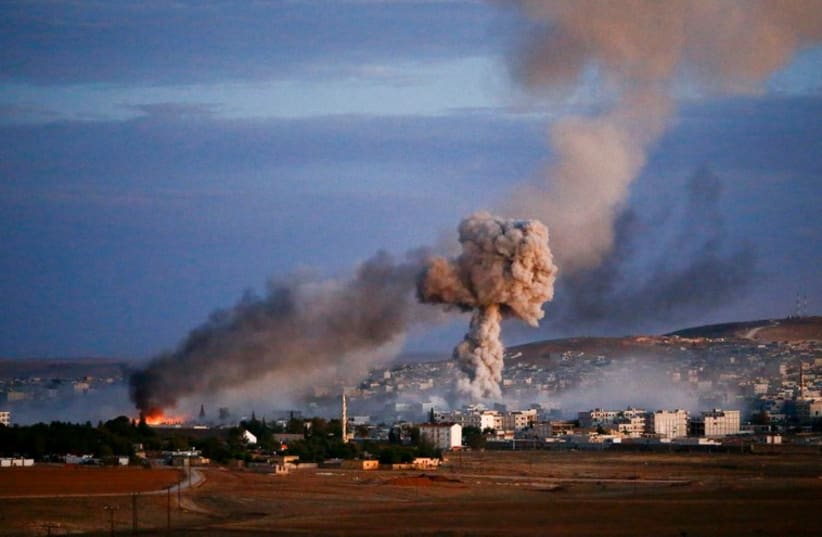The Syrian army said on Sunday evening that an Israeli airstrike targeted parts of southern Damascus in escalating attacks that regional intelligence sources say target Iran-linked assets.
התקיפה המיוחסת לישראל בדמשק: תגובה לפיצוץ הספינה בידי איראן. המטרות שהותקפו הן איראניות. תיעוד: פעילות מערכת ההגנה האווירית הסורית@kaisos1987 @roysharon11 pic.twitter.com/703R9QhACV
— כאן חדשות (@kann_news) February 28, 2021
A Syrian Army statement said the attack came from the Golan Heights and that it had downed most of the missiles, in the second such strike in less than a month on the outskirts of the capital.
An Israeli military spokesman declined to comment on the report.The strikes on Sunday night come just days after an Israeli-owned commercial vessel was attacked by mines in the Gulf of Oman.Israeli officials, including Prime Minister Benjamin Netanyahu and IDF Chief of Staff Lt.-Gen. Aviv Kochavi blame the attack on Iran, although Iran has not officially taken responsibility.
On Sunday morning, an analysis in the Iranian-regime controlled Kayhan daily, tied to Iranian Supreme Leader Ali Khamenei, referred to the attack on the Israeli vessel as a response to strikes on Iranian and pro-Iranian forces in Syria and Iraq.
The analysis stated that there is "no trace" of the identity of the attackers and claimed that the vessel was flown under the flag of another country. The paper additionally claimed that the ship was a military vessel spying in the Persian Gulf and not a commercial vessel.
The Iranian analysis concluded that the ship was "probably ambushed by one of the branches of the Axis of Resistance," but did not go as far as explicitly stating that Iran or one of its proxies was responsible for the incident.
While Israeli media reported that the strikes on Sunday night were an Israeli response to the attack on the ship, no official government or military statement was made on the matter. In the past, the IDF has often confirmed when it responded to specific attacks.The strikes also come just days after the US targeted Iranian sites in eastern Syria, killing at least one militant and wounding several others, in response to a rocket strike blamed on pro-Iranian militias on a US military base at Erbil International Airport in northern Iraq on February 15 in which a non-American contractor was killed, as well as a series of additional rocket attacks on other locations in Iraq with US forces, according to Reuters.The last alleged Israeli strikes to target the Damascus area were reported on February 15, reportedly targeting equipment belong to Iranian and pro-Iranian forces near the Damascus International Airport, as well as other targets.The strikes are the seventh in the past two months, with strikes attributed to Israel reported in eastern, southern and Western Syria in January and earlier in February.
Israel has struck a wider range of targets than usual since the start of the year, including a major strike on Iranian-linked strongholds further east near the Iraqi border.
Israeli Defense Minister Benny Gantz on Friday said Israel was taking action "almost weekly" to prevent Iranian entrenchment in Syria.
Regional intelligence sources were quoted in the media saying that Iran's Quds Force and militias it backs, whose presence has spread in Syria in recent years, have a strong presence in the Sayeda Zainab neighborhood of southern Damascus where Iranian backed militias have a string of underground bases.
Israel has regularly attacked what it says are Iranian-linked targets in Syria in recent years, and stepped up such strikes this year in what Western intelligence sources describe as a shadow war to reduce Iran’s influence.
Kochavi said in December Israel had struck over 500 targets in 2020.
Tensions remain high in the region in the aftermath of the assassination of Iranian nuclear scientist Mohsen Fakhrizadeh just east of Tehran, which Iran blames on Israel, and the one-year anniversary of the US assassination of former IRGC Quds Force commander Qassem Soleimani in January. Israel's northern border remains tense as well due to continued threats by the Lebanese Hezbollah terrorist organization to carry out a revenge attack against Israel in response to the death of a Hezbollah militant in Damascus in July in an airstrike blamed on Israel.
Concerns surrounding the Biden administration's intent to return to the nuclear deal with Iran have also been raised in recent weeks, with Kochavi stating last month that he had ordered operational plans to strike Iran’s nuclear program to be ready if necessary.
Tzvi Joffre contributed to this report.
